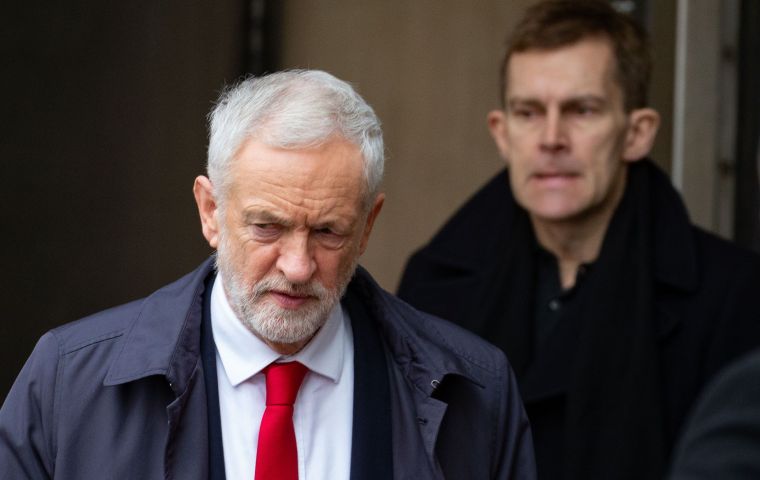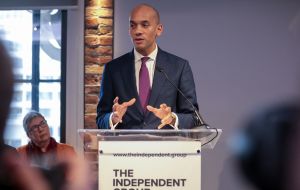MercoPress. South Atlantic News Agency
Seven MPs quit Labour criticizing the party's Brexit policy and anti-Semitism
 Labour leader Jeremy Corbyn said he was “disappointed” the MPs had left the party.
Labour leader Jeremy Corbyn said he was “disappointed” the MPs had left the party.  “Jeremy Corbyn and those around him are on the wrong side in so many international issues, from Russia, to Syria to Venezuela,” said Mike Gapes
“Jeremy Corbyn and those around him are on the wrong side in so many international issues, from Russia, to Syria to Venezuela,” said Mike Gapes  “Politics is broken, it doesn't have to be this way, let's change it,” said MP Chuka Umunna at the launch of The Independent Group
“Politics is broken, it doesn't have to be this way, let's change it,” said MP Chuka Umunna at the launch of The Independent Group Seven British Labour MPs have quit their party and set up as a group of independents, saying politics in Britain is “broken” and criticising Labour policy on Brexit and its failure to tackle anti-Semitism among its membership.
The split was immediately compared to the ‘Gang of Four’ who left Labour in 1981 to form the Social Democratic Party, splitting the left vote and resulting in Margaret Thatcher winning crushing parliamentary majorities at the next two elections. But the new group said they were not forming a new political party, and rejected comparisons to the SDP, saying it was a different era and they would not be contesting by-elections.
“Politics is broken, it doesn't have to be this way, let's change it,” said MP Chuka Umunna at the launch of The Independent Group, urging MPs from Labour and other parties to join them and support centrist policies that were “evidence-led” rather than ideological.
They will support a push for a new Brexit referendum, Umunna said, which was supported by Labour members but not its leadership.
Luciana Berger said resigning had been “very difficult, painful but necessary”. She said she could not remain in a party that was “institutionally anti-Semitic” and had “a culture of bullying, bigotry and intimidation.”
Chris Leslie said Labour had been hijacked by the “machine politics of the hard-left”, and Mike Gapes said he was sickened by anti-Semitism in the party and was furious with the Labour leadership for facilitating Brexit.
“Jeremy Corbyn and those around him are on the wrong side in so many international issues, from Russia, to Syria to Venezuela,” he said.
Labour leader Jeremy Corbyn said he was “disappointed” the MPs had left the party.
Former leader Ed Milliband said he deeply regretted the MPs’ decision, saying “Labour must and will continue to be a broad church as it has always been.”
London mayor Sadiq Khan said he was friends with all the MPs who had quit and that it was a “desperately sad day.”
He agreed on the need for a new Brexit referendum, and that “the Labour Party needs to do much more to root out the evil of anti-Semitism”, however, he said “when the Labour Party splits it only leads to one outcome – a Tory government.”
The split has been rumoured for months, with many speculating it would result in the formation of a new centrist party, mirroring the 1981 split. The briefly-popular Social Democratic Party was founded when four Labour moderates quit in disgust at the party’s militant wing.
The so-called ‘Gang of Four’ who split from Labour issued a statement known as the Limehouse Declaration, which complained of a “drift towards extremism in the Labour Party” and supported membership of the then European Community.
The new group also issued a statement, saying it was dedicated to “the progressive values that were once held true by Labour [but] which have since been abandoned.”
The statement said: “Labour now pursues policies that would weaken our national security; accepts the narratives of states hostile to our country; has failed to take a lead in addressing the challenge of Brexit and to provide a strong and coherent alternative to the Conservatives’ approach; is passive in circumstances of international humanitarian distress; is hostile to businesses large and small; and threatens to destabilize the British economy in pursuit of ideological objectives.
“For a party that once committed to pursue a spirit of solidarity, tolerance and respect, it has changed beyond recognition. Today, visceral hatreds of other people, views and opinions are commonplace in and around the Labour Party.”
They immediately came under attack from Labour supporters who demanded that by-elections should be held in their constituencies.
Within an hour of the announcement the group’s new website had crashed. The group said that was a sign of “overwhelming support.”
Despite the ruling Conservative Party’s own continuing internal power struggle, and widespread disapproval over its handling of Brexit, the latest opinion poll had the Conservatives and Labour neck and neck with 37% national support.
Approval for Corbyn, already low, has plunged over his response to the Brexit deadlock: he has continued to support the project, albeit on ‘softer’ terms, rather than follow the wishes of a majority of Labour members who want a fresh referendum.
One poll found his ‘dissatisfaction’ score at 72%, a record for any opposition leader, Labour or Conservative. No opposition leader with satisfaction scores this low has managed to unseat a prime minister in an election. Though no election is due until 2022, Labour is pushing for an early election over Brexit. Corbyn supporters say he has a track record as a popular campaigner who over-achieves in elections.




Top Comments
Disclaimer & comment rulesCommenting for this story is now closed.
If you have a Facebook account, become a fan and comment on our Facebook Page!